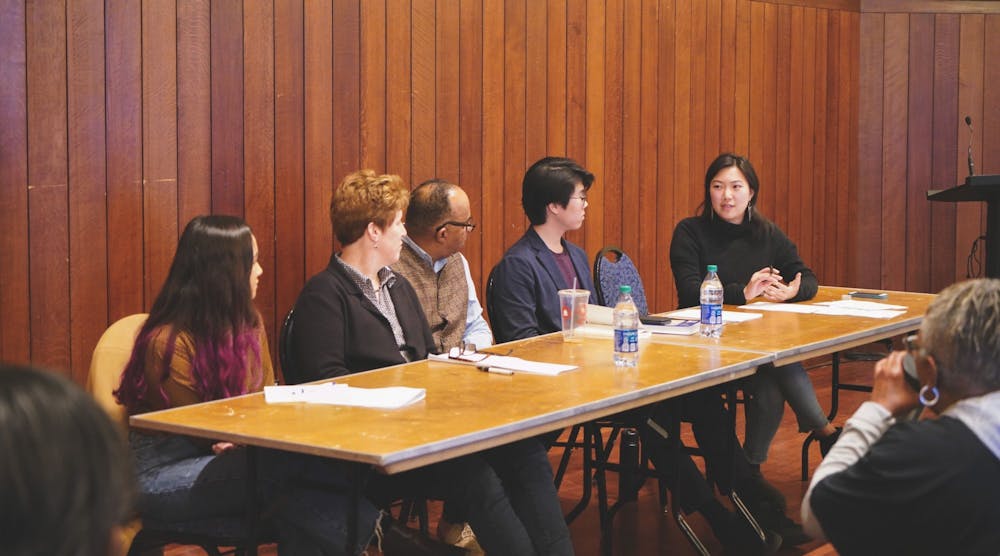In addition to the effects of the pandemic, the United States has been facing a number of major social challenges. Among these is the battle against racial injustice that many have been tirelessly fighting. There has recently been a rise in youth activism, both in social media and beyond. This work can be seen and felt in various forms, including the establishment of on–campus activist groups.
One of these groups is the Lotus Collective at Penn, which consists of students and workers who “read, study and discuss the history and ideas of past revolutionary movements and thinkers in order to understand and transform the world and [themselves], for the freedom of humanity.”
The Lotus Collective was founded by two students who branched out from Penn SLAP—the Penn Student Labor Action Project— a collective that aims to create fair working conditions for campus workers. A little over a year ago, former SLAP members Caleb Chen (C ‘21) and Michelle Lyu (W ‘19) created their own group, which began as a reading club for students.
During their initial meetings, members came together to read and discuss works, such as activist Grace Lee Bogg’s autobiography. Soon after, the group opened up to more than just Penn students.
This has transformed the group dynamic, expanding from a reading club exclusively dedicated to those in the Penn community, to a collective that focuses on transforming the role of students in politics especially within the Philadelphia area. The Lotus Collective has continued to read and discuss books together, but has now begun to incorporate other types of programming, such as live events and symposiums.
Sophie Hirt (W ‘23) talks about the collective’s focus in the Philly area, mentioning that the group seeks to answer questions surrounding Penn students' responsibilities in terms of belonging to the community.
“These are questions that we've really tried to get to the root of by studying history and knowing the history of Philadelphia. What the Civil Rights Movement and the Black freedom struggle have meant for this city, and then how it shapes what we see today,” she says. “Right now we're more involved in questions about gentrification and how Penn has been really involved in that in the city, and how that shapes the community around Penn and how people's lives have been transformed from it.”
When the group first formed, the early members met in PAACH—the Pan–Asian American Community House at Penn. However, even though the Lotus Collective started as an Asian American centered group, its identity has grown beyond that.
Sophie mentions that the ideas that are shared within the Lotus Collective apply to everyone in American society, not only Asian American students: “As far as right now, we still see the importance of us starting as an Asian group because, especially in this time, it's important for Asian people to have different models of who they can become as far as politics and social justice. And that also brings us closer to other Asian groups, other Asian communities. [The] main thing of the Lotus collective, I think, is unity and seeing how, civilizationally and culturally, people can relate to each other on the basis of being human and having the same struggles.”
When discussing the focus of the group and the activists that they study, Caleb adds: “They all have a common thing to them, which is their belief in humanity or willingness to commit so strongly to transform the world. And I think that's something that we want to be able to reflect in the readings and what we do.”
The group’s name, the Lotus Collective, is a fitting representation of their identity and mission. The Lotus is a flower that grows in different parts of Asia, representing the group’s Pan–Asian unity. However, what is unique about the flower is that it grows in mud, which the members of the collective see as a metaphor for their work at Penn. Sophie expresses how she sees the Lotus Collective as breaking from the cycles of discrimination and oppression, "choosing humanity" instead.
Caleb and Sophie recall one of the Lotus Collective’s most significant events, a two–day symposium honoring W.E.B. Du Bois. During this event, a number of students, scholars, and campus workers came together to discuss the impact that gentrification and other social issues have had on the Philadelphia community.
“It was a beautiful moment because you saw people from all different parts of the city in one room, talking about, 'okay, where do we go from here? After all that's happened in the city, the destruction that's been caused, the lives that have been grabbed, where do we align ourselves with now?'” Sophie says. “And [the workers] seeing Caleb and I and the other students in the room as the potential for change because they have every right to see us as the enemy or see us as just privileged students who don't know what they're talking about. But they listened to us, and they heard us, and they were moved by what we were saying, even though we had so much to learn from them.”
Ultimately, the Lotus Collective seeks to continue being a space in which students can become more active and create change in their community. Even though their programming is now remote, the group continues to seek opportunities to create meaningful dialogue among its members.
The members of the Lotus Collective are looking forward to seeing what the future has in store for them. As a group that has become largely collaborative, incorporating mentors from outside of Penn, the members hope more students can join them to discuss these important issues.

